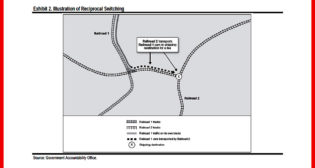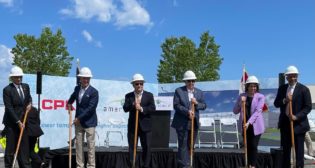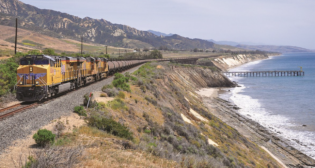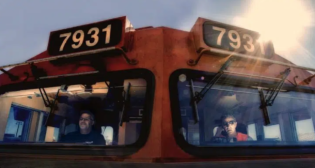
Dysfunctional Washington Must Not Slow Us Down
Written by Chuck Baker, President, ASLRRA
Chuck Baker, President, ASLRRA
ASLRRA PERSPECTIVE, RAILWAY AGE OCTOBER 2023 ISSUE: As this column is written, the federal government is either shut down or operating under a short-term Continuing Resolution. Whether shut down or just limping along, there appears to be little appetite for compromise between the warring factions in Congress. Be that as it may, the short line industry has much government-related business to concern itself with in the coming months.
In a Sept. 7 Notice of Proposed Rulemaking (NPRM), the Surface Transportation Board (STB) closed Docket No. EP 711 Sub No. 1 and proposed a new set of regulations (Sub No. 2) that would provide for the prescription of reciprocal switching agreements to address inadequate rail service as determined by using objective standards. Comments were due Oct. 23*. This proposal shifts the conversation about STB measures to a service-based standard in a way that makes sense to many short lines.
Throughout the comment period on EP 711, ASLRRA argued that short lines should be exempt from that proposed rule, and that appears to be the case under the new NPRM. But as the saying goes, the devil is in the details, and our comments will address those details to ensure that short lines are not inadvertently subject to the proposed rule. Short line railroads generally only serve a limited number of predominantly small- and medium-size shippers and only survive by providing those shippers flexible and reliable first-mile/last-mile service. It is critically important for both the short lines and shippers that this rail service is not jeopardized by a regulation not relevant to a typical short line operation.
The CRISI program has been an important source of infrastructure funding for short lines. It is the only federal program that short lines are directly eligible for, and the matching portion is typically affordable for small businesses. The recently announced FY22 awards were record-breaking for our industry. Short lines garnered 47 of the 70 projects awarded for $720 million, about half of the $1.4 billion available. We applaud Congress for continually recognizing the value of short line railroads, and the FRA for carrying out Congressional intent when evaluating projects for this round of funding.
Short line projects selected include those that will address safety with grade crossing improvements, trespassing mitigation elements, upgrades to track to the 286,000-pound GRL standard, bridge repairs, and rail environmental impact improvments retrofitting or purchasing locomotives to achieve Tier 3, Tier 4 or zero emissions status, and more. Although $720 million puts a real dent in the short line state-of-good-repair backlog, we are hardly done. We expect to see a combined FY23 and partial FY24 NOFO for CRISI as soon as December or January. We are working to ensure that the program is funded at the highest possible levels for FY24 and beyond and that short lines are in position to compete vigorously for those opportunities.
Short line CRISI awards are the best bang around for the public buck as short lines are expert in investing scarce resources wisely in projects that improve safety, add value to the shippers they serve, and enhance the interconnected freight rail industry.
Somewhat off our regular beaten path, ASLRRA is also supporting two new legislative initiatives this Congressional Session. The first is a short line disaster relief bill (H.R. 3782) introduced by Congressman Byron Donalds (R-Fla.). Short line railroads are generally not eligible for disaster relief from FEMA, and SBA loans are insufficient. U.S. DOT has emergency relief programs at the FTA and FHWA, but there is nothing at the FRA that can be deployed quickly to assist small railroads facing disaster damages. The program envisioned is designed to help when insurance and other resources are not available. This is a bi-partisan bill that currently has 20 co-sponsors.
Congress recognized the gap in the federal disaster relief framework in 2008 with a $20 million one-time appropriation responding to a cluster of natural disasters that damaged 17 short lines in the Midwest. This program is modeled on that successful effort.
The current political deadlock in Congress highlights the need for a permanent program that is ready when needed. It is imperative to restore basic infrastructure promptly following a disaster to facilitate the broader response and recovery efforts. Short line rail service is a key piece of that recovery, shipping relief supplies and materials into, and damaged materials out of, the area. Quickly restoring service is equally important to shippers who absolutely depend on their short line to keep their small businesses up and running. The need for immediate relief should not be dependent on Congress’s ability to act quickly.
The second legislative initiative is a proposed new program that would help short line agriculture shippers fund infrastructure projects to improve loading facilities, increase storage capacity, improve access between shipper and short line infrastructure and acquire additional railcars. The program would be included in the new five-year Farm Bill, which must be reauthorized in this Session of Congress, and we are currently working with a large group of individual shippers to develop appropriate legislative language and secure a bi-partisan group of House and Senate sponsors.
The short line industry has a lot of business to conduct with the Congress in the coming months, and it is our hope that this column finds the government open for business.



